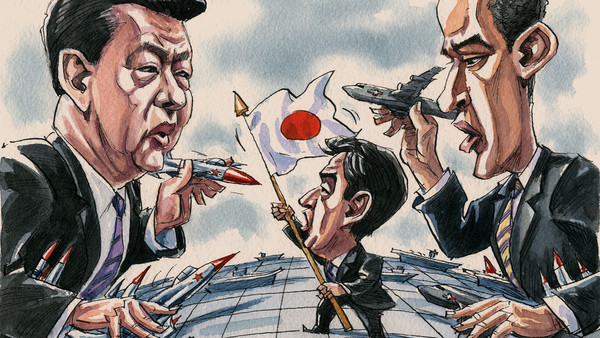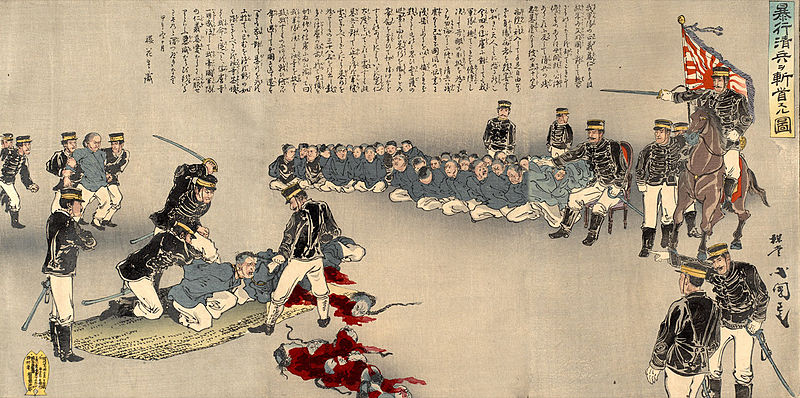Scott77
China Vs US and Japan War: Who is going to Win?
by Scott77 14 Replies latest social current
-
-
Nathan Natas
China.
-
doofdaddy
China will drown us all in the West with plastic crap and internet propaganda.
-
zeb
Who will win a war over some rocks? No one.
-
besty
anybody shorting the stockmarket and buying bitcoin maybe
-
DesirousOfChange
Halliburton.
Lockheed Martin.
Boeing.
-
fulltimestudent
I doubt very much that there will be any fighting!
But China may use this issue to harm Japanese business interests in China, which are significant.
----------------------------------------------------------------------------------------------------------------------------
Here's a brief overview of the legal issues involved in claims of ownership to these (uninhabited) islands, called Diaoyu in Chinese and Saikaku in Japanese.
Before the late 19th century, the islands were clearly understood to be Chinese.
The earliest historical records of the island being under China’s maritime jurisdiction date back to 1403 in texts prepared by imperial envoys of the Ming Dynasty.
During the Qing Dynasty, the islands were under the jurisdiction of the local government of Taiwan province.
Maps published throughout the 1800s in France, Britain, and the United States all recognize the Diaoyu Islands as a territory of China.
So how did the Japanese get an interest in these islands?
In the late 19th C. (the age of Imperialism) Japan sought to copy the west and build an Empire, they started building a remarkably good military forces.
Japan's first war of aggression in the modern age, started with Japanese moves on Korea (which country was later annexed and an attempt made to incorporate it into Japan, that was the second attempt in history-which is why the Koreans hate the guts of the Japanese). China had alliance obligations with Korea, stretching back for centuries. The confrontation developed into the first Sino-Japanese war (1894-1895), in which it became clear that the Qing dynasties attempts to modernise the Chinese military had failed.
But, the war had consequences - it sowed the seeds of hate, not just because of the war, but because of the behaviour of the Japanese military:
A Japanese sketch of Japanese soldiers beheading Chinese prisoners-of-war.
Unable to match Japanese military and naval skill, t he Chinese sued for peace.
The Japanese were exultant, and saw their victory in these terms:
From Japan Punch 1894
In the ensueing Treaty of Shimonoseki , the Japanese were ceded influence in Korea (which was what they wanted) and Manchuria (the homeland of the Qing Dynasty) but more importantly from the perspective of this topic, they were conceded control of (sovereignty) over Taiwan and adjacent islands, including Diaoyu- the islands at the centre of the present dispute, which the re-named Saikaku.
The Japanese ruled Taiwan for the next 50 years.
The next question is, how did Japan lose control of Taiwan? (not to mention Korea and Manchuria, etc)
The brief answer is: After Japan surrendered following defeat in World War II, international treaties - the Cairo Declaration and the Potsdam Proclamation, legally returned all territories stolen by Japan to pre-revolutionary China.
But why not the Diaoyu/Senkaku Islands?
That's where issues get murky. Somehow the United States, as the post WW2 military government of the Western pacific, did not include Diaoyu/Senkaku Islands in teh territories returned in 1945 to Chiang Kaishek's, Republic of China.
Why not? Good question, isn't it?
-
fulltimestudent
Why not? Good question, isn't it?
Whatever the answer, you can draw an almost straight line from the first Sino-Japanese war in the last decade of the nineteenth century,
through the end of the the Qing dynasty in 1912, and the establishment of the ineffective Republic of China,
through the split in the ensuing KMT/GMD party of Sun Yatsen, into the struggle between the Nationalist and Communist parties to the Communist victory in 1949 (with the American elite squealing - "who lost China?" as part of the McCarthy era hysteria)
Through the re-building of Chinese national strength , initially under Mao Zedong, but when Mao proved too much of an ideologue, under Deng Xiaoping,
through to this current incident.
----------------
As previously posted, I do not believe the current confrontation will lead to live shooting. The Chinese likely wish to exert some more pressure, and to demonstrate to the home market, that they will not be like the 19th/20th century Chinese governments who surrendered China to a century of humiliation.
They know better ways to fight opponents!
-
fulltimestudent
BTW- just for the record, I fell a certain sympathy for the poor bloody Japanese.
First, whatever spin contemporary Americans wish to place on Matthew Perry's "opening of Japan," it was a blatant act of aggression. "Open the door," he commanded, "or, I'll blow it open!!"
The Japanese knew all about the aggressive tendencies of the west. In the 17th century, the Spanish conquerers in Manilla, had approached the Japanese to take part in an invasion of China. The Japanese had committed troops to that venture, which the King of Spain refused to permit. I suggest that would've been part of the national discussion that took place in Japan, before the decision to submit to Perry's command.
On the principle, "if you can't beat them, then join them," the Japanese set about modernising, albeit always consideriung what they wanted to retain from their previous background.
The watched the western powers intently to try to understand the undercurrents and the western powers competed to train their armies, and to sell them the latest battleships, (which they promptly copied, and learned to build for themselves). Beating the Chinese did not create any concerns in the west, but the 1904-05 war with Imperial Russia did. The Japanese defeated two Russian fleets, and for the first time in some hundreds of years, an Asian nation defeated a European one.
But after December 1941,
USS Arizona under attack.
------------------------------------------------------------------------------------------------------------------------
American war-time propaganda characterised the Japanese as barbaric and treacherous. All they had done was to copy the west, and sadly, the evidence seems to indicate that the US elite at least had an inkling that their could be an attack. It poses the question, was Roosevelt prepared to sacrifice American lives, in order to further his own ideological opinion?
-
Simon
The big powers rarely go head to head unless there are stumendously stupid people in power. I don't think the current Chinese or US leadership is so dumb, they are simply rattling sabres but there is always a risk when people start playing chicken than someone somewhere will make a mistake and escalate things.



_burning_after_the_Japanese_attack_on_Pearl_Harbor_-_NARA_195617_-_Edit.jpg/758px-The_USS_Arizona_(BB-39)_burning_after_the_Japanese_attack_on_Pearl_Harbor_-_NARA_195617_-_Edit.jpg)
